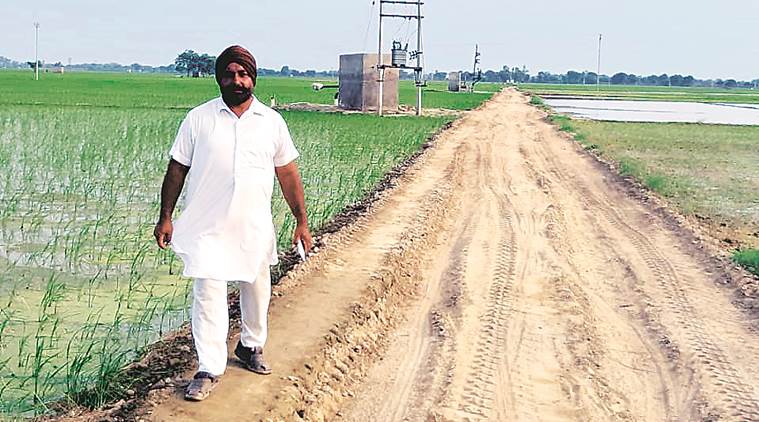
Three weeks after the paddy planted over 150 acres owned by him and his extended family were completely destroyed after Ghaggar flooding, Kabul Singh Sekhon has managed to re-transplant rice saplings again. He would not have managed this without help from farmers, and religious places in neighbouring Haryana, who had grown some spare rice saplings that were supplied to him. Sekhon has now urged Punjab government to grow spare paddy/basmati saplings at an ‘off season’ nursery for flood prone areas.
Given the time lost due to the rain misery, Sekhon is now only planting short-durating basmati varieties. Though he will have to be satisfied with non-MSP crop now with less yield, but still he hopes to cut his losses. Paddy, which has Rs 1815 per quintal MSP this year, has a yield above 30 quintals per acre. Basmati yield is 20 to 22 quintals per acre and has no assured market.
As Ghaggar swelled, it submerged his entire crop under five feet water for over a week. The land owned by the family extended to Moonak, the most affected village. “The moment water receded I started efforts to look for rice seedlings. I finally got it from three sources — a farmer, a trader and one gurdwara sahib in Haryana,” he said.
“I have spent Rs 7,000 per acre re-transplanting rice saplings again which included Rs 2000 as cost of seedlings, Rs 4000 as labour cost. Remaining amount I spent on transportation of seedlings,” said Sekhon.
Like Sekhon, Hardeep Singh, who is sarpanch of village Macorad Sahib near Moonak, too faced huge losses when the paddy crop on his 15 acres land got uprooted due to Ghaggar flood. But Hardeep was Lucky as he could get seedlings from Gurdwara Macorad Sahib free of cost. Like him, other farmers of his village also got saplings from gurdwara and transplanting on nearly 700 acres is being done in his village. But all of them had to spend labour cost again.
Another farmer Jasbir Singh of in Bathinda’s Mian village had to spend Rs 5000 per acre for procuring ‘off season’ Basmati seedlings from a fellow farmer, who had some spare seedlings after sowing in his own fields.
For majority of farmers, who are re-sowing either basmati, maize or some pulses, the cost has been significant. Crop planted over 90,000 acres was damaged after single day rain in Punjab on July 16 in five districts including Bathinda, the worst affected, Sangrur, Mukatsar Sahib, Patiala and Fatehgarh Sahib.
“We are getting the announcement done in the villages about the availability of basmati 1509 nursery with us so that farmers can get it for re-plantation as still they can do it by mid August,” said Agriculture Development Officer (ADO) for Lehra and Moonak in Sangrur, Dr Inderjit Singh Bhatti. He said that seedlings were being supplied free of cost from a nursery set up by the district administration at land owned by Gurdwara Macorad Sahib.
“Ghaggar area gets inundated with flood water every now and then, and our point is that every time farmers arrange the seedlings if re-planting time is left, while government only announced a meagre compensation,” said Kabul Singh.
Jagmohan Singh, General Secretary BKU (Dakaunda), said that the weather patterns were seeing changes which required measure to meet such emergencies. “If individual farmers in Haryana and Punjab can anticipate this and grow spare rice seedlings why can’t government do this as there is hardly any big investment involved,” he said.
Meanwhile, due to floods, the area under basmati crop can be increased because farmers are left with the basmati sowing time only.